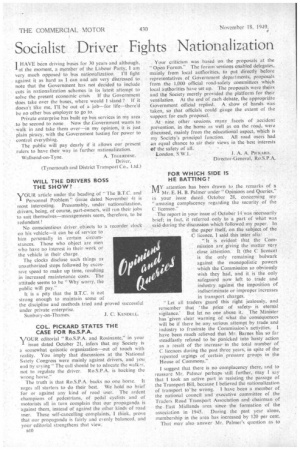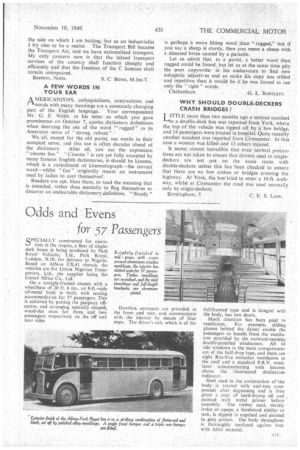Socialist Driver Fights Nationalization
Page 52

Page 55

If you've noticed an error in this article please click here to report it so we can fix it.
I HAVE been driving buses for 30 years•and although.I at the moment, a member of the Labour Party, I am very. much opposed to bus nationalization. fight against it as hard as I can and am very distressed to note that the Government has not decided to include cuts in nationalization schemes in its latest attempt to solve the present economic crisis if the Government does take over the buses, where would I stand'! If it doesn't like me, I'll be out of a job—for life—there'd be no other bus employer to go to.
Private enterprise has built up bus services in my area to be second to none, Now the ,Government wants to Waik in and take them over—in my opinion, it is just plain piracy, with the Government lusting for power to control everything.
The public will pay dearly if it allows our present rulers to have their way in further nationalization.
Wallserid-on-Tyne. A. TFAIERDINE.
• Driver, (Tynemouth and District Transport Co., Ltd.) WILL THE DRIVERS BOSS THE SHOW?
VOUR article under the heading of " The B.T.C. and Personnel Problem" (issue dated November 4) is
most interesting. Presumably, under nationalization, drivers, being, of course, part-owners, will rim their jobs to suit themselves—managements seem, therefore, to be redundant !
No conscientious driver 'objects to a recorder clock on his vehicle—it can beof service to him pzrsonally in 'certain circumstances. Those who object are men who have no interest in their.work or the vehicle in their charge.
The clocks disclose such things as unauthorized stops followed by excessive speed to make up time, resulting in increased maintenance costs. The attitude seems to.be " Why worry, the public will pay."
It is a pity that the B.T.C. is not strong enough to maintain some of the discipline and methods tried and proved successful under private enterprise.
Sunbury-on-Thames. J. C. KENDELL.
COL. PICKARD STATES THE CASE FOR Ro.S.P.A.
YOUR editorial "Ro.S.P.A. and Rosinante," in your issue dated October 21,, infers that my Society is a somewhat quixotic organization—out of touch with reality. You imply that discussions at the National Safety Congress were mainly against drivers, and 'you'. end by s:Yying " The call should be to educate the walk-sr.
not to regulate the driver. Ro.S.P.A. is backing the wrong horse."
The truth is that Ro.S.P.A. backs no one horse. It urges all starters to do their best. We hold no brief for or against any kind of road user. The ardent champions of pedestrians, of pedal cyclists and of motorists all in turn complain that our propaganda is against them, instead of against the other kinds of road user. These self-cancelling complaints, I think, prove that our propaganda is fairly and evenly balanced, and .,.!citir• editorial strengthens that view.
B 0 Your criticism was based on the proposals at the " Open Forum." The forinn sessions enabled delegates, mainly from local authorities, to put directly before representatives. of Government departments, proposals from the 1,000• official road-safety committees which local authorities have set up. The proposals were theirs and the Society merely provided the platform for their vientilation. At the end of each debate, the appropriate Government official replied. A show of hands was taken, so that officials could gauge the extent of the support for each proposal.
At, nine other sessions many .facets of ,accident prevention, in the home .as well as on the road, were discussed, mainly from the educational aspect, which is my Society's principal function. All road users had an equal chance to air their views in the best interests of the safety of all.
London, S W.I. J. A. A. PICKARD.
Director-General, Ro.S.P.A.
FOR WHICH SIDE IS HE BATTING?
'NAY attention has been drawn to the, remarks of a 1'1 r. E. H.. B. Palmer under Opinions and Queries," in your issue dated. October 28, concerning my "amazing complacency regarding the security . of the C licensee."
-The report in your issue of. October 14 was necessarily brief; in fact, it referred only .to a ,part of what was said during the discussion which followed my paper. In the paper itself, on the subject of the C licence, I said this inter alia: • • "It is evident that the Commission are giving the matter very close 'attention. It (the C licence) • is the only remaining bulwark against the monopolistic powers which the Commission so obviously wish they had, and it is the only safeguard now left to trade and industry against the imposition of indiscriminate or improper increases in transport charges.
" Let all traders guard this right jealously, and remember that 'the price of safetyis eternal vigilance.' But let no one abuse it. ,.The Minister has 'given clear warning of what the consequences will be if there be any serious attempt by trade and industry to frustrate the Commission's activities. I have been much relieved that Mr. Barnes has so far steadfastly refused to be panicked into hasty action as .a result of the increase 'in the total number of C licences during the past three years, in spite of the repeated urgings of certain pressure groups in the House of Commons."
I suggest that there is no complacency there, and to reassure Mr. Palmer perhaps still further, may I say that I took an active part in resisting the passage of the Transport Bill, because I believed the nationalization of transport to' be wrong. I have been a member of the national council and executive committee of the Traders Road Transport Association and chairman of the East Midlands area since the formation of the association in 1945. During the past year alone, membership in the area has increased by 120 per cent.
That may also answer Mr. Palmer's question as to
the side on which I am batting, but as an industrialist I try also to be a realist. The Transport Bill became the Transport Act, and we have nationalized transport. My only concern now is that the inland transport services of the country shall function cheaply and efficiently and that the freedom of the C licensee shall remain unimpaired.
Beeston, Notts. S. C. BOND, M.Ins.T.
A FEW WORDS" IN YOUR EAR A MERICANISMS, colloquialisms, contractions and "words with many meanings are a constantly changing part of the English language. Your correspondent Mr. G. E Webb, in his letter to which you gave prominence on October 7, quotes dictionary definitions when decrying the use of the word '" rugged' in its American sense of "strong, robust,"
We all except for the old purist, use words in their accepted sense, and this use is often decades ahead of the dictionary. After all, you use the expression "cinema fan." "Cinema ". is not yet fully accepted by many famous English dictionaries, it should be kinema, which is a curtailment of kinematograph—the correct word—whilst " fan " originally meant an instrument used by ladies to cool themselves!
Readers are apt, bless them, to read the meaning that is intended, rather than mentally to flog themselves to discover an undesirable dictionary.clefinition. " Sturdy " is perhaps a more fitting word than "rugged," but if you say a sheep is sturdy, then you mean a sheep with a diseased brain caused by a parasite.
Let us admit that to a purist, a better wordy than rugged could be found, but let us at the same time pity the poor copywriter in his endeavours to find new eulogistic adjectives, and so make his copy less stilted and repetitive than it would be if he was forced to use only the right" words. '
Cheltenham. G. L. BARTLETT.
WHY SHOULD DOUBLE-DECKERS CRASH BRIDGES
I ITTLE more than two months ago a serious accident .1--Ato a double-deck bus was reported from York, where the top of the vehicle was ripped off by a low bridge, and 14 passengers were treated in hospital. Quite recently another accident was reported from Cirencester In this case a woman was killed and 13 others injured.
It seems almost incredible that even normal precautions are not taken to ensure that drivers, used to singledeckers are not put on the same route with double-deckers unless this has been checked to ensure that there are no low arches or bridges crossing the highway. At York, the bus"tried to enter a 10-ft, archWay, whilst at Cirencester the •road was used normally only by single-deckers.
Birmingham. 5 C. E. S. LANE.




























































































